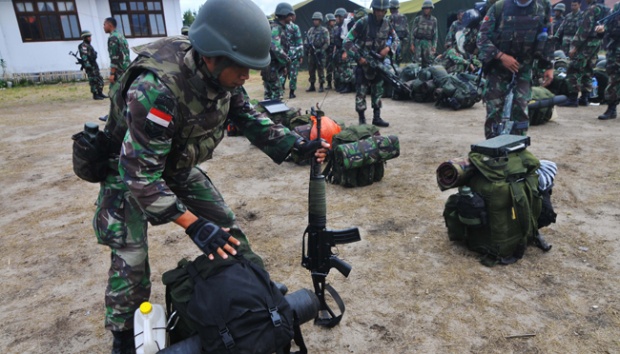The War On Terrorism
Translator
Editor
Kamis, 1 Januari 1970 07:00 WIB

TEMPO.CO, Jakarta - For four years, he was at the top of the nation's most wanted list, hiding in the midst of the thick forests of Central Sulawesi. Last week, security forces shot and killed fugitive terrorist Santoso, along with a fellow militant. This time, there is no doubt he is dead, unlike previous occasions when he had often erroneously been reported as being killed. His fingerprints and a forensic identification of his body leave no doubt it was indeed him.
It was a predictably grim ending for the misadventures of Santoso, also known as Abu Wardah, who in 2014 declared an oath of loyalty to the Islamic State of Iraq and Syria (ISIS). The successful Operation Tinombala, involving the National Police and the Indonesian Military (TNI), to end Santoso's terror spree is truly laudable. Although Santoso is not as notorious as Malaysian militants Azahari bin Husin and Noordin Mohammad Top both of whom were killed by the police counterterrorism unit Detachment 88 Santoso was still someone to be reckoned with. He was behind the series of shootings and bombings in Central Sulawesi's Palu and Poso regions between 2010 and 2014, a track record that placed him on the US government's list of the world's most wanted terrorists.
Santoso's demise does not immediately translate into a lesser threat from terrorism. Past experience has shown that when one terrorist leader falls, a new one appears. Muhammad Basri, also known as Bagong, one of his most trusted followers, still roams the Poso area. Police need to ensure that he and Santoso's other potential successors can no longer resume their terror campaign.
Operation Tinombala itself deserves further scrutiny whether it would be appropriate to make it a law enforcement modus operandi in hunting down terrorists in specific regions. Distinct from the previous hunt for Azahari and Noordin Top, who mainly operated in Java's urban areas, the Santoso group used rural Poso as its base.
They cleverly used the jungle for their hit-and-run attacks, mostly targeting rural villages. At any time, they could appear in the midst of a busy market and trigger a bomb or carry out an assassination. This was the difficulty faced by the police, despite setting up a special unit known as Camar Maleo. Another reason was Santoso's own personal knowledge of the lay of the land and the limited manpower available to track him.
In early January, the authorities changed tactics. This time, the police invited the TNI to take part in a joint sweep to capture the elusive Santoso once and for all. Task Force Tinombala was seen as ideal for the mission because it brought together the paramilitary Police Mobile Brigade, the Army Strategic Reserve (Kostrad) and the elite Special Forces (Kopassus). In total, some 3,000 police and military personnel were thrown into the hunt. Eventually cornered, Santoso died at the hands of encircling Kostrad soldiers.
It was evident that the success of the joint operation relied on one important criterion: central control exercised by police commanders. This was not about one element being stronger or better. It was in full compliance with Law No. 15/2003, which clearly defines terrorism as a criminal act that must be addressed under civilian legal jurisdiction. Involving the TNI in counterterrorism operations is certainly permissible so long as it functions as a supporting force.
This is important to understand because there is a tendency to push for the military to become directly involved in the war against terrorism. It is reflected in the draft revision of the 2003 legislation, which is currently being deliberated in the House of Representatives (DPR). A proposed change to Article 1, Chapter 43B, for example, opens the possibility of counterterrorism duties being shared by the police, the TNI and other relevant government agencies.
If this revised article goes through, the potential for human rights violations will emerge. Distinct from the police, who are trained to use persuasive methods to apprehend criminals and bring them to court, the TNI's doctrine is first and foremost to kill the enemy. For this very reason, the revision in question must be rejected. We do not want to see the counterterrorism campaign turned into a war that would deny perpetrators their day in court.
The military is actually authorized to take on anti-terrorist operations under Article 1, Chapter 7 of the 2004 Armed Forces Law but according to very strict conditions. The first criterion applies when a terrorist act is perceived to be a direct threat to national sovereignty, although it is made clear in the legislation, that the police retain command authority. As they should. (*)
Read the full story in this week's edition of Tempo English Magazine




















